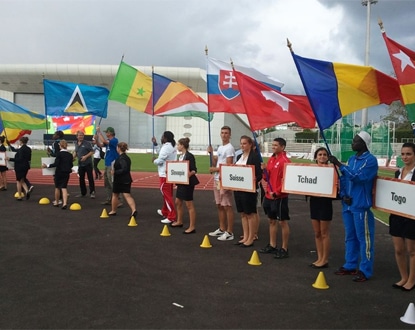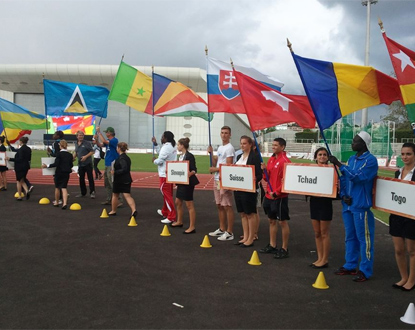After ten days filled with emotions, the 7th Francophonie Games have concluded. This festive event prominently showcased the values of sharing, brotherhood, solidarity, and excellence, which are dear to the Francophonie. See you in Abidjan in 2017.

For Bernard Maccario, General Director of the National Committee of the Francophonie Games: “This 7th edition, dedicated primarily to the public, with free events open to all, has met with great popular success. Tens of thousands of spectators were able to attend high-quality contests and competitions. We particularly want to thank the 1,513 volunteers without whom nothing would have been possible.”
Mahaman-Lawan Seriba, Director of the International Committee of the Francophonie Games, stated: “Three elements were decisive in the success of the Games: performance, competitors’ enthusiasm combined with their desire to share. We can confidently and eagerly look forward to the 8th edition in Côte d’Ivoire.”
The sports competition was also intense and rich, with the highlight being African wrestling. This spectacle was very well appreciated, in addition to being a first-time broadcast event for this sport, spanning five continents. The “Creation” contest, Ecology, and Digital met our expectations as well. Quality was present, and they took their place in the program, alongside hip-hop. Thanks to media partners, international and national broadcasters, and other media present, the coverage was exceptional. We can confidently and eagerly look forward to the 8th edition in Côte d’Ivoire.”
Key figures of the 7th edition (source Organization)
• 54 delegations
• 10 days of competitions and contests
• 2,749 competitors
• 200 international judges and referees
• 20 competition and contest sites
• 250 journalists accredited to cover the event
• 1,513 volunteers who gave at least half a day of their time to welcome the delegations, the media, and the general public
• 5,000 students who throughout the Games attended sporting events, visited the Partners’ Village, and the exhibitions
• Tens of thousands of spectators attended all the events
• Nearly 15,000 visitors passed through the doors of the partners’ village from Sunday, September 8 to Saturday, September 14.
• 80 million spectators followed the Francophonie Games worldwide
• 50 hours of live broadcasting
Records and a Shower of Medals
• 4 Francophonie Games records were broken in athletics:
– Men’s shot put set by Poland’s Thomas Majewski (double Olympic champion) with a throw of 20.18 meters, breaking the Romanian Gheorges Guset’s record of 19.67 meters from 1994 at Bondoufle;
- Men’s javelin throw set by Poland’s Lukasz Grzeszczuk with a throw of 78.62 meters, breaking Egypt’s Abdelrahma El Sayed Ihab’s record of 77.33 meters from 2009 in Beirut;
- Women’s 10,000 meters set by Burundi’s Diane Nukuri with a time of 32:29.14 minutes, breaking Morocco’s Zhor El Kamch’s record of 33:41.28 minutes from 2005 in Niamey;
-
Women’s hammer throw set by Poland’s Anita Wlodarczyk with a throw of 75.62 meters, breaking France’s Manuela Montebrun’s record of 70.26 meters from 2009 in Beirut.
• Cultural contests: 36 medals in total (gold, silver, bronze) across 12 different disciplines awarded to 19 different countries
• Sports competitions: 300 medals in total (gold, silver, bronze) across 19 different disciplines (excluding by discipline category) to 31 countries.
Medal Podium
France finishes first in the medal rankings, with a total of 58 medals, including 23 gold. Canada and Poland complete this podium with 44 and 27 medals, respectively.
The Highlights of the Francophonie Games
Novelties
New competition sport: African wrestling
After being showcased as a demonstration at the 2005 Francophonie Games in Niamey, Niger, African wrestling made its competitive debut in Nice. The wrestlers of this traditional combat art competed in the heart of a 9-meter diameter sandy arena, outdoors. The competition was fierce and attracted a large crowd of spectators eager to discover this new discipline.
New cultural contest: street arts
For the first time in official competition at the Francophonie Games, street arts, consisting of juggling, hip hop, and giant puppets, were highly acclaimed by the public.
First participation of Qatar
24 Qatari athletes participated for the first time in the history of the Francophonie Games. They were present in four sports disciplines: athletics, judo, wrestling, and table tennis. They brought home a total of 8 medals.
Solidarity
Numerous volunteers serving the event
The city of Nice mobilized its population, and many volunteers responded to the call. This recruitment was done through the local associative and sports network. These volunteers played a crucial role and were highly involved.
Fraternity
Happy birthday Mr. Diouf! On September 7, while the Secretary General of the International Organization of La Francophonie was participating in the opening of the visual arts exhibition, Abdou Diouf was surprised to hear children visiting the venue singing “Happy Birthday.”
The little ones of the Francophonie
On Wednesday, September 11, under the Nice Theater, the opening of an exhibition on the Francophonie Games took place. A collective work created by 2,500 young people from Nice in tribute to countries that speak the language of Molière. In general, the youngest were avid spectators of the visual arts exhibitions, especially the wanderings of the giant puppets, which fascinated and transported them into dreamlike journeys.
Table Tennis: Six Medals for Two!
French table tennis players Laura Gasnier and Romain Lorentz made a “clean sweep” of the table tennis event. Silver medalists in mixed doubles, gold medalists in team events, a gold medal in men’s singles, and a silver medal in women’s singles, making it six medals in total for French table tennis.
Generosity
Solidarity with Haiti
The city of Nice and the National Committee of the Francophonie Games (CNJF) graciously welcomed the Haitian delegation comprising 70 members, as the country was still recovering from the January 2010 earthquake.
32 bicycles donated
CNJF donated 32 Lapierre brand bicycles to the runners from the Gabonese, Ivorian, Haitian, Burkinabe, and Egyptian delegations.
Personalities
The Nice flag bearers Camille Muffat and Lionel Bringuer opened the festivities. After the opening ceremony attended by the French President François Hollande, accompanied by Yamina Benguigui, Minister Delegate for La Francophonie, Valérie Fourneyron, Minister of Sports, Youth, Popular Education, and Community Life, Abdou Diouf, Secretary General of La Francophonie, the President of Côte d’Ivoire, Alassane Ouattara, and the President of Lebanon, Michel Sleiman, many other personalities came to the Francophonie Games. Ilie Nastase, the playful Romanian tennis player, came with his compatriot, Olympic gymnastics champion Nadia Comaneci. Together, they visited the Partners’ Village. Just like Jean-Philippe Gatien, the French table tennis world champion. Marc Toesca, a French radio and television host, and Jean-Marc Généreux, a Canadian dancer and TV judge, respectively presented the finals of the creation song and dance contests. Finally, SAS Prince Albert I of Monaco attended the football final.



